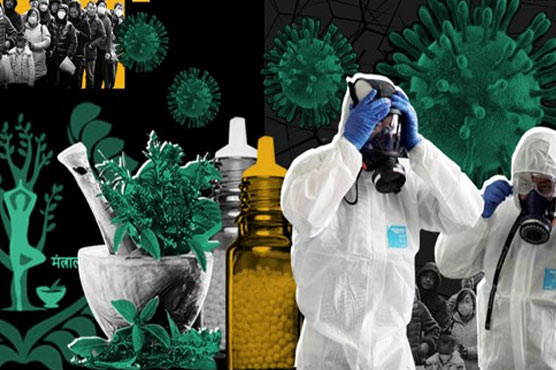Indian ministry lambasted over clinically invalid homeopathic cure for coronavirus

None of the medicines prescribed in the advisory appeared to have undergone clinical validation.
(Web Desk) – The Indian Ministry for Traditional Medicines has been lambasted by country’s own the Indian Medical Association for promoting traditional healing to combat the coronavirus epidemic.
The association assailed the ministry calling them “immature and irresponsible” for suggesting homeopathic remedies to avoid the infections.
According to South China Morning Post, as India reported its first case of coronavirus this week and China and other nations accelerated efforts to stop the spread of the outbreak, New Delhi’s Ministry of Ayurveda, Yoga and Naturopathy, Unani, Siddha, Sowa Rigpa and Homoeopathy (AYUSH) on Wednesday publicized its recommended cure for the disease: homeopathic treatments and other alternative medicines.
Along with generic recommendations and personal hygiene tips, the communique advised that patients ingest various herbal concoctions to “strengthen the immune system” and other traditional medicines “useful in [the] symptomatic management of coronavirus infection”.
None of the medicines prescribed in the advisory appeared to have undergone clinical validation.
The advisory said that homoeopathic or alternative medicines would prevent infection and treat symptoms of the coronavirus, which has so far spread to as many as 24 countries.
The virus, which is spread through the air by coughing and sneezing and through human-to-human contact, has so far caused at least 200 deaths. Although medical researchers are working on developing a vaccine to combat the disease, there is no known cure.
Dr RV Asokan, secretary general of the Indian Medical Association, which comprises more than 300,000 medical practitioners, said it was premature of AYUSH to recommend unproven therapies for coronavirus treatment or prevention.
“We specifically think the AYUSH ministry going to town with such recommendations for an outbreak of such global nature is immature, premature and irresponsible – particularly at a time when it’s a public health emergency and the first case is already reported in Kerala and India is ripped open,” said Asokan, referring to an Indian student from Wuhan University who was found to be infected with the coronavirus after returning to his home in the southern state of Kerala from China.
“Why do the systems of medicines which do not even recognize microbes as disease-causing agents… [say] they can treat the coronavirus?” he asked.
Asokan said that any treatment or medication for the coronavirus needed rigorous testing by the scientific community. “Any procedure or methodology or epidemiology should undergo a double-blind controlled test where the investigator and patient are unaware of what medicine is used,” he said. “And this process should be able to be repeated both qualitatively and quantitatively.”
With unverified social media posts in India already advocating various home-made treatments and drugs to tackle the coronavirus, there are fears that AYUSH’s recommended treatments will help bring out even more unproven remedies and folk medicines.
But after a public backlash against AYUSH gained steam, the ministry was forced to issue a clarification on Thursday saying it had issued its original advisory “as a preventive measure and not claiming to be treatment advice for the coronavirus infection.”
India’s Ministry of Health and Family Welfare – which regulates health policy in the country outside AYUSH’s domain of traditional medicine systems – refused to comment on the matter and referred any questions to AYUSH.
However, Dr Piyush Joshi, secretary general of the Homeopathic Medical Association of India, which is independent of AYUSH, defended the use of homeopathic therapies, saying in an interview that they had “a proven track record of being very effective for prophylactic effect in epidemic diseases”.
Asked about the possible side-effects of the recommended treatment for the coronavirus – a highly diluted solution of arsenic trioxide used by homoeopaths that has in the past resulted in arsenic poisoning due to negligence – Joshi said the suggested quantity would not have serious consequences.
“The fortunate part about homoeopathy is, one need not worry much about the type of virus,” Joshi claimed. “Through the generalised symptoms of all the patients, we’ll be able to find an effective remedy” for any virus that can be used as “a preventive medication for all the population”.


